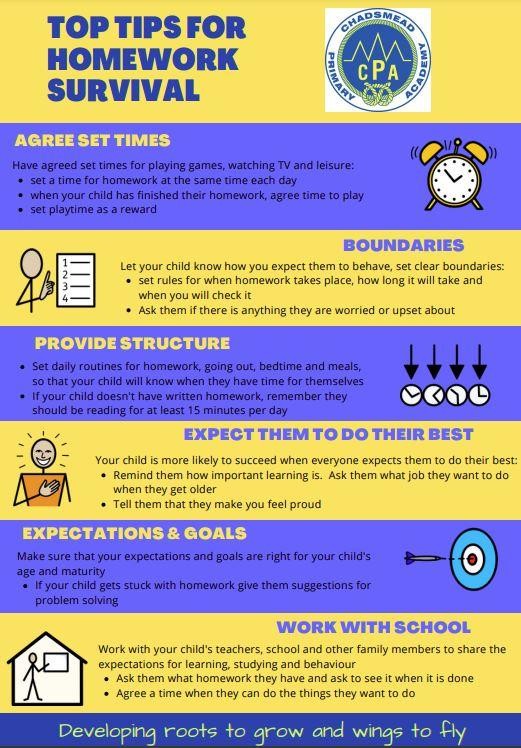Children are learning all of the time and they spend many more hours at home with their families than they do at school. A child’s development is the shared responsibility of families, school and the wider community. As children become older, they also become more and more responsible for their own learning.
Learning is not just about academic subjects. It is important that children develop as rounded human beings who are able to socialise, communicate, be creative, keep healthy, stay safe and enjoy life. At Chadsmead Primary Academy we recognise that many families are very busy and that it is important to strike a balance between school, extra-curricular activities and family life. It is also important that home learning requirements are clear to both the pupil and the parent/carer.
Home learning serves a number of purposes:
· Develop independent learning skills;
· Helps parents/carers to support their child’s learning;
· Consolidate learning;
· Practice skills;
· Starts to prepare children for the expectations of secondary education.
Parental Involvement
If parents/carers show an interest in children’s home learning and praise their efforts, then children are more likely to feel that homework is valued and thus put in more effort. We really hope that parents will want to be involved in supporting their children’s home learning. Remember, however, that it is the child’s home learning it shouldn’t be done for them!
As a school we value family support and hope that all families understand that learning continues beyond the school day. We expect families to support their child(ren) with home learning and ensure that it is completed to a good standard and handed in on time. We do understand, however, that home learning can cause stress at home and we will do our best to work with parents and children to alleviate any such pressures. It is essential that parents/carers communicate with the class teacher if home learning is causing problems at home.
Please also see our Top Tips for Home learning Survival document.
Reading
Children need to develop a love of books from a very early age and parents are encouraged to share books and read stories with their children almost from birth. Children will have weekly access to their class or school library. They will select books for their families to read to them, to share with siblings or read to themselves. Reading to or with a child is an important part of a daily routine. It is also important to witness adults reading regularly. During the early stages of reading development, children will be issued with texts at appropriate level for them to read to an adult. Once reading skills are developed, children will be able to choose their own books for independent reading based on ZPDs (see our reading curriculum for more details). It is important that parents show an interest in their child’s reading by asking questions, encouraging children to read a short extract out loud etc. All children should be reading their phonics books daily or their reading book for 15 minutes each day.
Spelling
Your children are taught the spelling patterns and conventions at school, but they need to practice these at home daily.
Times Tables
A rapid recall of the multiplication and division facts to 12x12 is paramount to be able to understand the more complex mathematical concepts. Not knowing these facts will hinder progress made. Please continue to practise these until they are secure, at least 5 minutes every day.
Further Home Learning Ideas
Whilst home learning tasks, which are set by the school, can provide children with valuable learning experiences, the scope and range of these tasks has to be limited so that all children are able to undertake them.
Families can make a significant contribution to their child’s broader development through providing a range of opportunities and experiences in addition to those provided by the school. These can make a significant difference to how children approach new concepts and undertake problems and challenges within the classroom. See suggestions below:
- Involve children in day to day tasks that require the application of basic literacy and numeracy skills. For example: writing a shopping list, counting out cutlery items for dinner, weighing ingredients, working out change, telling the time.
- Make car journeys count - maths songs, audiobooks, following road maps, I-spy (shapes, numbers, words).
- Link local family excursions to school topics, e.g. visit to Tamworth Castle, Black Country Museum, Birmingham Art Gallery
- Playing board games that develop number, word and problem solving skills.
- Art & craft activities that develop artistic talents but also support fine-motor development.
- Dressing-up box - great for developing imagination and storytelling skills.
- Getting out and about in different environments that extend children’s knowledge and understanding of the world.
- Extra-curricular clubs and activities that develop social, physical, musical skills, etc.

